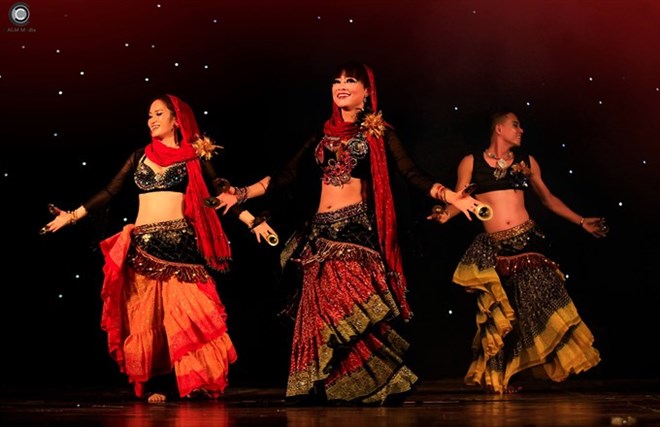
Performances by famous Vietnamese and international belly dancers are on show at the Ahlan International Belly Dance Festival held on October 19-23 in the northern province of Ninh Binh.

The Ahlan International Belly Dance Festival gathers many famous
Vietnamese and international artists. (Photo: VNA)
The event is a great chance for lovers of belly dancing to share their
experiences through workshops and enjoy performances by a number of well-known
belly dancers, including Aleksei Riaboshapka from Ukraine, Nari Heo from the
Republic of Korea, Nana Nazakawa from Japan, Gulden Fatkulla from Kazakhstan
and Summer Deng from China.
They are regarded as belly dance masters, capable of spreading knowledge about
their performance skills and inspiring their trainees.
Riaboshapka is a well-known performer and a recognised choreographer of belly
dance and oriental folkloric styles. Belly dance communities and festivals of
almost thirty countries welcomed his art and passion for oriental dance. He is
a leading teacher and judge of the League of Belly Dance Masters in Russia. In
his home country, he created his own unique dance company RA-Studio whose
students are taught by professionals. Many of them are winners of prestigious
contests worldwide. Alekei’s workshops are known to be interesting, creative
and fun. His talent, choreographic originality and bright personality have touched
many dancers.
"I am very happy to share my skills and soul to help dancers and see the belly
dance community grow,” he said.
"This is the second time we have organised an international belly dance
festival,” said dancer Ha Van, head of the organising board.
"We have tried to bring world masters to introduce them to Vietnamese belly
dancing as well as create the chance for domestic artists to exchange and find
inspiration.”
Source: VNA
With an increasingly vibrant and widespread emulation movement aimed at building cultured residential areas and cultured families, Yen Thuy District has been making steady progress toward improving both the material and spiritual well-being of its people, while fostering a civilized, prosperous, beautiful, and progressive community.
Once lacking recreational spaces and community facilities, Residential Group 2 in Quynh Lam Ward (Hoa Binh City) has recently received attention for the construction of a new, spacious, and fully equipped cultural house. The project followed the model of state support combined with public contributions in both labor and funding.
The "All people unite to build cultural life" movement, which has been effectively integrated with Kim Boi district’s socio-economic development goals, is fostering a lively spirit of emulation across local residential areas, hamlets, villages, public agencies, and enterprises. In addition, through the initiative, traditional cultural values are being preserved and promoted, while community solidarity and mutual support in poverty reduction and economic development are being strengthened.
A working delegation of the Hoa Binh provincial People’s Committee led by its Permanent Vice Chairman Nguyen Van Toan on June 11 inspected the progress of a project to build the Mo Muong Cultural Heritage Conservation Space linked to tourism services in Hop Phong commune, Cao Phong district.
Born and growing in the heroic land of Muong Dong, Dinh Thi Kieu Dung, a resident in Bo town of Kim Boi district, in her childhood was nurtured by the sweet lullabies of her grandmother and mother. These melodies deeply imprinted on her soul, becoming an inseparable part of her love for her ethnic group's culture. For over 20 years, this love for her hometown has driven Dung to research, collect, and pass down the cultural values of the Muong people to future generations.
In the final days of May, the Ethnic Art Troupe of Hoa Binh Province organized performances to serve the people in remote, mountainous, and particularly disadvantaged areas within the province. These were not just ordinary artistic shows, but they were the meaningful journeys aimed at spreading cultural values, enhancing the spiritual life of the people and contributing to the preservation of ethnic minority cultural identities.



